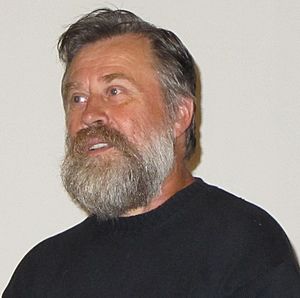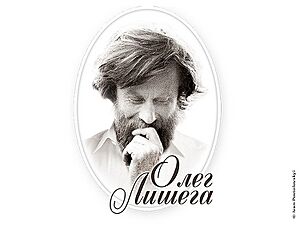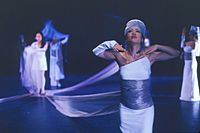Oleh Lysheha facts for kids
Quick facts for kids
Oleh Lysheha
|
|
|---|---|
 |
|
| Native name |
Олег Лишега
|
| Born | 30 October 1949 Tysmenytsia, Ukrainian SSR |
| Died | 17 December 2014 (aged 65) Kyiv, Ukraine |
| Occupation | Poet, translator |
Oleh Lysheha (Ukrainian: Олег Лишега; born October 30, 1949 – died December 17, 2014) was a famous Ukrainian poet, playwright, and translator. He was also known as a deep thinker. Oleh Lysheha started studying at Lviv University in 1968. During his last year, he was forced to leave because he was part of an "unofficial" group of writers called Lviv Bohema.
As a punishment, Lysheha was sent to serve in the Soviet army and then had to live away from his home. From 1972 to 1988, he was not allowed to publish his writings officially. But in 1989, his first book, Great Bridge (Velykyi Mist), finally came out. Oleh Lysheha and his co-translator, James Brasfield from Penn State University, won the 2000 PEN Award for Poetry in Translation for "The Selected Poems of Oleh Lysheha." This book was published by the Harvard Ukrainian Research Institute. Lysheha was the first Ukrainian poet to ever receive this important PEN award.
Contents
Oleh Lysheha's Early Life
Oleh Lysheha was born in 1949 in Tysmenytsia, a village in the Carpathian Mountains area of Ivano-Frankivsk Oblast, Ukraine. His parents were both teachers. Twenty years later, Lysheha began studying foreign languages at the University of Lviv, which is named after the famous Ukrainian poet Ivan Franko.
In 1972, Lysheha was expelled from the university and had to join the Soviet army. This happened because he was a member of Lviv Bohema. This was a group of artists at Lviv University who did not agree with the government's rules. After serving in the military, Oleh Lysheha went back to his hometown. He worked at a local factory there.
Moving to Kyiv and New Opportunities
Later, Lysheha returned to Lviv. Soon after, he moved to Kyiv, the capital city, where he got married. He worked as a technical employee at the Kyiv Theatrical Institute of Karpenko Karyi. Even with this job, Lysheha kept writing poems and translating other works.
From 1997 to 1998, Oleh Lysheha was a special guest scholar at Penn State University in Pennsylvania, United States. This was part of the Fulbright Program. After he came back to Ukraine, Lysheha became very busy with his art. He wrote more poetry, created paintings, and made sculptures. He also continued to split his time between Kyiv and his childhood home in the Carpathian mountains.
His Poems and Translations
When he was forty years old, Lysheha published his first collection of poems. It was called "Great Bridge" (1989). This book quickly made him one of the most important poets in Ukraine. Years later, he met James Brasfield, who would become his co-translator. Together, they published "The Selected Poems of Oleh Lysheha" in 1999. This was the first time English readers could enjoy his work.
One of Oleh Lysheha's most important plays is "Friend Li Po, Brother Tu Fu." This play is included in the second part of his 1999 English book. Thirteen years after his first book, Lysheha published another collection called "To Snow and Fire" (2002).
Lysheha's Work as a Translator
Oleh Lysheha also made important contributions as a translator. He translated works by famous writers like T. S. Eliot and Ezra Pound into the Ukrainian language. He also helped write a book of translations from Chinese, called "The Stories of Ancient China."
"The Selected Poems of Oleh Lysheha"
Many literary experts have said that "The Selected Poems of Oleh Lysheha" – the English versions of his work – are very different from traditional Ukrainian poetry. For example, one reviewer noted that his poems are "influenced by natural philosophy." They also show a "total denial of a technocratic world," meaning he didn't like modern technology. His publisher, Harvard University Press, described his work as "informed by transcendentalism and Zen-like introspection." This means his poems explore deep thoughts about human life and nature.
No matter the style, Lysheha and Brasfield won the 2000 PEN Award for Poetry in Translation. The award ceremony was held on May 15 at the Walter Reade Theater at Lincoln Center for the Performing Arts in New York City. Lysheha himself chose the poems for the book, showing how his writing changed over time. The book is divided into three parts. The first part has shorter poems. The second part is a clever, short play called Friend Li Po, Brother Tu Fu. The third part contains longer poems that tell more detailed stories.
Example of Poetry
"Bear" (Vedmid)
After dining in the moonlight,
He sorted the bones —
The small and the larger separated accurately
On ground that was still warm —
What if someone should come along and decide
To carve a hole in one
And make a flute..
To greet the dawn..
Otherwise things were the same —
The wild garlic was growing darker, the blackberries were filling out..
And his paw was still strong enough,
To protect the night..
— Oleh Lysheha, 1997
Translated by Virlana Tkacz and Wanda Phipps
Oleh Lysheha's Work with Yara Arts Group
Virlana Tkacz and Wanda Phipps began translating Oleh Lysheha’s poems in 1991. Their group, Yara Arts Group, performed his poems in two languages. These performances happened at the Ukrainian Institute of America in New York. That summer, Virlana staged Lysheha’s prose poem “Mountain” at Yara’s Theatre Workshop at Harvard. For several years, she also staged parts of his play “Friend Li Po, Brother Tu Fu” and other poems like “Swan” and “Bear.” In 1998, Yara held a special event to celebrate Oleh Lysheha’s poetry.
In 2003, Virlana Tkacz created a full stage production of Lysheha’s poem “Swan.” It was performed at La MaMa Experimental Theatre in New York. The show featured artists Andrew Colteaux and Soomi Kim, with music by Paul Brantley. A critic from the Village Voice newspaper wrote that Andrew Colteaux’s performance was very lively. It showed the poem’s feelings of loneliness and longing.
Yara’s production of “Swan” was also performed at Harvard. A critic from Kyiv, Dzvinka Matiash, wrote that the show was an amazing way to translate Lysheha’s words. She said it wasn't just a translation into English, but a translation of poetry into music, light, images, and movement. She felt that this is what true art should be like.
In 2011, Yara staged Lysheha's poem "Raven." This show was even nominated for an award for its design. Amy Lee Pearsall from nytheatre.com wrote that "Raven" inspired the performers to "glorious flight." She added that the show was both simple and complex. In 2013, Yara created "Dream Bridge," which used Lysheha’s earliest poems. They performed this show in Kyrgyzstan, Kyiv, and New York.
Tkacz and Phipps have published their translations of Lysheha’s work in several journals. These include Index on Censorship and Visions International. Their translations also appeared in books like One Hundred Years of Youth and In a Different Light. You can also find their translations on the Poetry International and Yara Arts Group websites.
 | Georgia Louise Harris Brown |
 | Julian Abele |
 | Norma Merrick Sklarek |
 | William Sidney Pittman |



